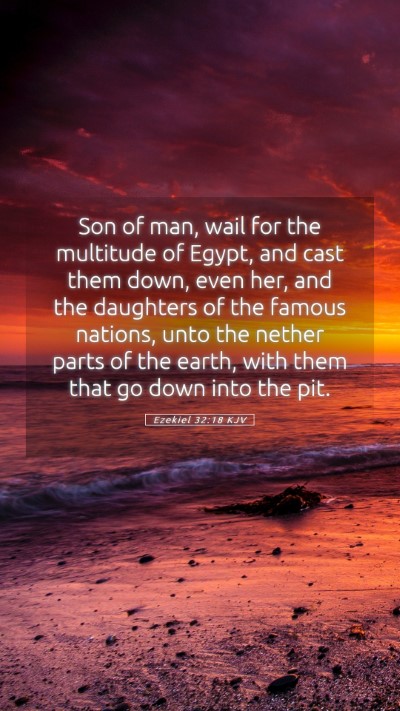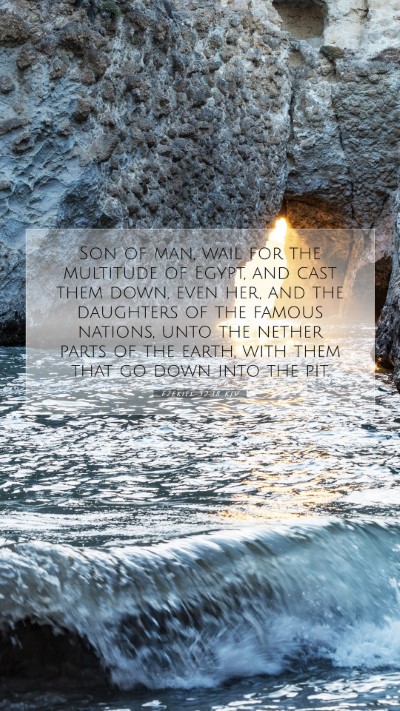Bible Verse Commentary: Ezekiel 32:18
The verse Ezekiel 32:18 presents profound insights within its context, utilizing the comments of respected biblical scholars such as Matthew Henry, Albert Barnes, and Adam Clarke. This commentary assists in understanding the deeper meanings and implications of the scripture for both personal reflection and broader theological studies.
Overview of Ezekiel 32:18
Ezekiel 32:18 is part of a larger oracle concerning Egypt's fall and the dirge to be sung by those in the grave. The verse states:
"Son of man, wail for the multitude of Egypt, and cast them down, even her, and the daughters of the famous nations, unto the nether parts of the earth, with them that go down into the pit." (Ezekiel 32:18 KJV)
Contextual Background
Understanding Ezekiel 32:18 requires acknowledging its place in the narrative of judgment against Egypt. The prophet Ezekiel, addressing the fate of the Egyptians, emphasizes their imminent fall. Scholars highlight the significance of Egypt in biblical history, particularly its representation of pride and power in opposition to God's sovereignty.
Commentary Insights
Matthew Henry's Commentary
Matthew Henry emphasizes the sorrow of God over the destruction of nations. He interprets Ezekiel 32:18 as a call for mourning over Egypt's downfall, which reflects a divine lamentation. Henry points out the metaphorical significance of the "pit," suggesting that it represents a place of utter despair and loss, reserved for those who have lived in defiance of God. Through this commentary, one can understand that the remembrance of fallen nations serves as a warning against pride and unrepentant sin.
Albert Barnes' Analysis
Albert Barnes elaborates on the implications of wailing for Egypt, suggesting that this lamentation is not merely an expression of grief but also serves as a lesson to other nations. He argues that the verse addresses both the immediate audience and future generations, highlighting the consequences of ignoring God's judgment. In Barnes' view, the mention of “the daughters of the famous nations” indicates the widespread impact of Egypt's fall, reinforcing the idea that no power is exempt from divine justice.
Adam Clarke's Interpretation
Adam Clarke details the metaphor of burial in the “nether parts of the earth” and links it to the historically significant cities of Egypt, which will fall to obscurity. Clarke's commentary emphasizes the reality of judgment and mortality, contrasting the earthly glory of Egypt with its destined downfall. He further explains that this verse serves not just as a warning but as an invitation to Egypt's leaders to reflect on their deeds and the futility of human pride.
Thematic Elements
This verse encompasses several key themes:
- The Reality of Divine Judgment: Ezekiel 32:18 exemplifies the certainty of God's judgment against nations that reject Him.
- The Fragility of Human Power: Despite Egypt's might, this passage illustrates the fallibility of worldly authority.
- The Call to Mourn: It recognizes the significance of mourning for the lost and the lessons embedded within such laments.
Application to Modern Readers
For contemporary audiences, Ezekiel 32:18 serves as a reminder of the consequences of pride and rebellion against God. It's an invitation to reflect on the impermanence of earthly achievements and encourages believers to seek humility.
The verse also prompts discussions in Bible study groups, emphasizing the importance of analyzing prophetic literature and understanding its historical context. For those seeking Bible study resources, this verse underscores the richness of scripture analysis and the need for careful Biblical exegesis.
Related Scripture Cross-References
- Jeremiah 46:26: A similar prophecy concerning Egypt's downfall.
- Ezekiel 30:4: Related to the impending judgment on Egypt.
- Isaiah 19:1: The prophetic statement regarding Egypt's downfall.
- Revelation 20:14: The concept of the 'pit' in relation to final judgment.
Conclusion
In conclusion, Ezekiel 32:18 contains messages of profound significance for both biblical understanding and personal reflection. Through Bible verse interpretations from esteemed scholars such as Henry, Barnes, and Clarke, readers can grasp not only the historical aspects of the text but also its relevance to modern life. This collective analysis of the meaning of Bible verses encourages deeper inquiry and application of scripture as believers strive to align their lives with God’s word.


